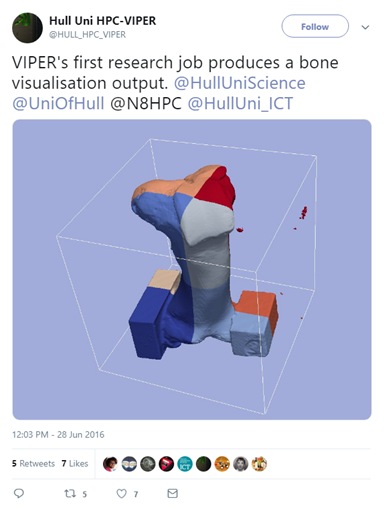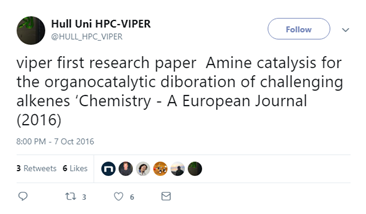On June 28th 2016, after a lot of hard work by a lot of people to bring High Performance Computing to the University of Hull, Viper ran its first production job.

Now three years later, Viper has made a massive contribution to research here at the university. Over 1.5 million jobs have been run, consuming around 70 million CPU hours (that is work that would take around 8,000 years on a single processor). Viper is certainly kept busy, with resource utilisation often over 90% full and the scheduler busy ensuring fair access for our users.
Viper has transformed research, helping people scale simulations and models beyond what they had been able to previously contemplate, enabling new avenues of research and new approaches to research, and helped reduce time to publication.
A big thanks to you all at the viper team, work that was taking me a month to complete now takes a matter of hours!
A P.S. on a recent email!
Over 200 research staff and students have run jobs on Viper as part of their work and while the more traditional High Performance Computing research areas (Astrophysics, Computational Chemistry, Computer Science, Engineering, Bioinformatics, Environmental Sciences etc) are among the more common jobs seen running on Viper, over the last three years Viper has contributed to research across the University with increasing use from the Faculties of Arts, Cultures and Education, Health Sciences and Business, Law and Politics. It is fantastic to see the diversity of people making use of Viper and the sort of research being carried out.
In October 2016 we saw the first publication to come from work carried out on Viper, and there are now 40 publications (that we know of) on our publications list at https://hpc.wordpress.hull.ac.uk/research-outputs/.

As well as publications we have seen work carried out on Viper presented at numerous conferences and contributed to many PhD and Masters theses and undergraduate student projects. Viper has been represented at Science Festivals and other outreach events with the HPC administration team and users helping the public to understand what HPC is and what the impact has been on research at the university and beyond.
We would like to thank everyone for their hard work in these three years: all those involved in getting Viper to the University of Hull in the first place; everyone who has been involved in the HPC Steering Group; our colleagues past and present involved in supporting Viper, and not least all of our users!
In terms of the future Viper still has a lot to offer the research community here at the University of Hull. The HPC administration team are working hard behind the scenes on an update to the Viper software stack that should bring some exciting new functionality and performance improvements to Viper.
There is lots more research to be done and lots more jobs to run!


